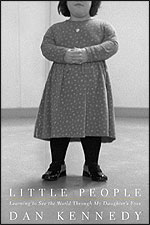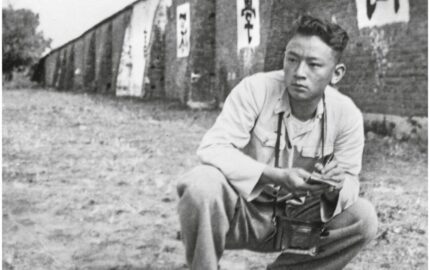
Using Harvard Book Store’s Espresso Book Machine—playfully named “Paige M. Gutenborg”—Dan Kennedy was able to revive his book “Little People.” Photo by Jonathan Seitz.
The fate of my first book—a memoir about raising a daughter with dwarfism—was not unusual for an obscure title by an equally obscure author. There was the day that the publishing house was convinced Oprah had agreed to book me. She hadn't. And there was the day that the publicity folks congratulated me after they'd heard The New York Times Book Review would soon weigh in. Their good wishes proved premature.
So despite favorable reviews in The Wall Street Journal and The Boston Globe as well as some attention from NPR and elsewhere, "Little People: Learning to See the World Through My Daughter's Eyes" soon faded away. The book was published in 2003. By 2008, when my publisher, Rodale, pulled the plug, it had sold a shade under 1,600 copies—not terrible, but nothing to make anyone sit up and take notice, either.
As I learned, though, there is such a thing as life after death, at least in the publishing world. Because of the Internet and some very slick printing technology, "Little People" remains visible and available. It's even making me money for the first time since 2002, when my agent, Andrew Blauner, sold the book to Rodale in exchange for a nice advance.
The comeback of "Little People" began with my decision to post it on the Web. Rodale had taken the essential steps of reassigning the rights to me and e-mailing me the PDFs, which I converted to HTML files and uploaded. I was especially pleased to be able to fix a grammatical error that had been bugging me for years. The site—to which I attached a Creative Commons license, allowing anyone to redistribute my work as long as they credited me and didn't try to profit from it—went live in the summer of 2008. The online version was free and came with the offer of a signed hardcover to anyone who wanted to buy a copy from my own dwindling supply. I sold maybe two dozen over the next two years.
Self-Publishing
In the spring of 2010, I received a message from Doug Haskell, the head of the English department at the high school in my hometown of Middleborough, Massachusetts. He told me that someone at the school had seen my website and remembered I was from Middleborough. He and his fellow teachers were considering making "Little People" that year's summer read, and he wanted to know if I was willing to drive down and discuss it with students during the following school year.
I didn't have to be asked twice. But I quickly discovered there was a problem. Haskell didn't want people to have to read an entire book online, and he asked me if there were enough books available. I scanned Amazon.com and other online sources of used books, and I learned that "Little People" was on the verge of extinction. What to do?
I decided to self-publish a new edition. At first, I considered going with an Internet service such as Lulu, as my friend Dan Gillmor did with his book "Mediactive". But though I'm sure Lulu would have done a fine job, I gravitated to the Harvard Book Store in Cambridge's Harvard Square, which had its own self-publishing operation with the too-cute name of Paige M. Gutenborg. Being able to drive to the store and talk with people face to face was important given that it was all new to me.
Bronwen Blaney, who was then in charge of the store's self-publishing services, skillfully guided me through the process. I wrote a new introduction and assembled the book as one long PDF, with a separate PDF for the cover. I tracked down the photographer who had shot the original cover image, Tsar Fedorsky, who kindly agreed to let me reuse it in return for a credit and a link to her website. No special software was necessary. I paid my $70 setup fee, and we were off and running.
Sales from Middleborough that summer were brisk, but I did not keep good records. So on a recent visit to the Harvard Book Store, Linden Marno-Ferree, the current self-publishing manager, helped me work through the numbers. As of this past October, the store had sold 132 copies at $16 each, the cover price I had set. I received $4.72 per copy. On top of that, I had purchased 80 copies at a bulk discount of 10 percent. Of those, I had sold 60 to a bookstore in Middleborough at a discount and had kept 20 for myself. I can't tell you exactly how much I made, but I'd say it was somewhere between $750 and $800.
The mechanical process itself is fascinating, but there's not much to see when it's actually taking place. At my request, Marno-Ferree printed a copy of "Little People." The pages were spit out of a Xerox 4112 photocopier and into the back of an Espresso Book Machine, manufactured by On Demand Books. I watched carefully as the pages were glued to the cover, made of heavy, semi-glossy stock, then cut to size. It took about seven minutes from start to finish. The book-making was controlled by both a Windows and a Macintosh computer, though I confess I'm not sure which did what. Self-published books by more than 100 authors are available through the Harvard Book Store, Marno-Ferree told me.
A final note: Technology saved "Little People," but recent advances may be undermining sales. My original idea of giving it away online and selling physical copies of the book was based on the notion that few people would want to sit in front of a computer and read an 80,000-word book.
Not long ago, however, I borrowed my wife's iPad and accessed the "Little People" website. As I suspected, the reading experience was pretty comfortable, and I'm not sure what incentive someone might have to buy a copy. I could remove the text of the book from the website and put together paid versions for the Kindle, the Nook, and Apple's iBooks. But not only would that take time, it would also defeat my original goal of making "Little People" freely available.
Last spring I talked about "Little People" to several hundred students at Middleborough High School. They asked good questions. I tried to answer them. It was a rewarding experience. And it wouldn't have been possible if technology hadn't given me the power to rescue my book from the publisher's scrap heap. I never expected to get rich from "Little People." It's enough that the book is still alive eight years after it stumbled out of the gate.
Dan Kennedy is an assistant professor of journalism at Northeastern University. He is a panelist on "Beat the Press" on WGBH-TV in Boston and a contributing writer for The Guardian. His book "Little People: Learning to See the World Through My Daughter's Eyes" is online at www.littlepeoplethebook.com.




